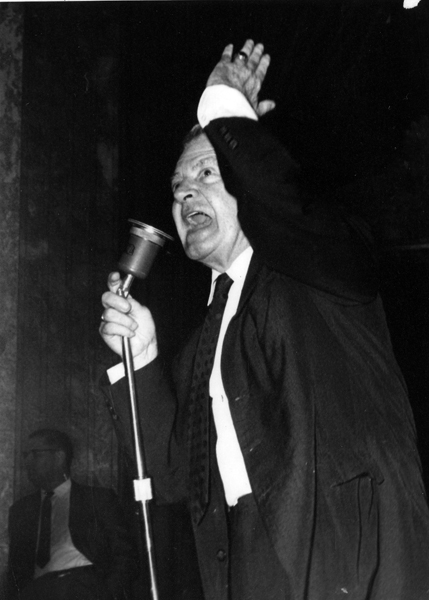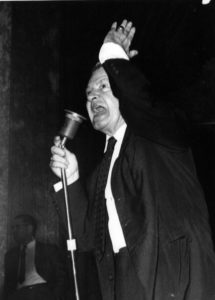Earl Long
Earl Kemp Long served three nonconsecutive terms as Louisiana governor.

Courtesy of State Library of Louisiana
Earl Kemp Long speaking. Unidentified
Earl Kemp Long served as governor of Louisiana for three nonconsecutive terms—from 1939 to 1940, from 1948 to 1952, and from 1956 to 1960—endearing himself to his constituents with the folksy nickname “Uncle Earl.” Though he was always in the shadow of his flamboyant older brother, Louisiana governor and US senator Huey Long, Earl Long’s march through Louisiana politics was characterized by his colorful verbal expressiveness and eccentric behavior—he was briefly admitted to a mental hospital in 1959 and was unabashed in his affair with a Bourbon Street stripper, Blaze Starr. Nonetheless, Long helped bring much-needed social reform to the Pelican State. He established an impressive record that included progressivism in the field of civil rights—a particularly unique achievement for a white southern politician in the mid-twentieth century. Long’s personal indiscretions, however, were also an important part of his record. In the end, voters knew what they would get from Long—a crusader for the common man, a heavy dose of entertainment, and an unpredictable personality that often produced unwanted results.
Early Life
Born on August 26, 1895, in Winn Parish to livestock farmer Huey Pierce Long Sr. and Caledonia Tison, Earl Kemp Long enjoyed a peaceful childhood in a large family. In 1912 he dropped out of high school to follow his favorite brother, Huey, to Memphis, Tennessee, where he found employment with the Faultless Starch Company. Later Earl bounced around as a traveling salesman and tried his hand at college, enrolling briefly in the Louisiana Industrial Institute (now Louisiana Tech) in Ruston and Louisiana State University in Baton Rouge. While tirelessly campaigning to help Huey get elected to the State Railroad Commission in 1918, Earl Long found his own calling: politics. Earl recalled his contributions to Huey’s successful first attempt at a run for public office: “I put up the $125 qualifying fee for Huey’s first fun for the Railroad Commission, and I wore out an old jitney working for him. I sold him more than the baking powder I was supposed to be selling.”
As Huey’s political star began to rise, he regularly turned to his brother for advice, and the younger Long proved to be not only a faithful supporter but also an astute political thinker. In 1924 Earl Long entered Loyola College (now Loyola University) in New Orleans and began a two-year non-degree program that would prepare him to take the state bar exam. Despite passing the exam in 1926 and opening a private practice in New Orleans, politics remained his primary interest. When Huey campaigned for governor, Earl Long was there, serving as his brother’s primary advisor and helping build the powerful Long political machine. Over time, however, Earl began to feel underappreciated for all he had done to catapult his brother into the spotlight, leading to a falling out between the brothers starting in 1930, when Earl began to openly defy his brother’s political directives. By 1932 the situation had grown so tense that Earl ran for lieutenant governor on an anti-Huey Long platform. Even after losing the race, Earl continued to openly defy his “yellow coward” brother until he returned to Huey’s fold in 1934.
Life after Huey
Huey Long’s assassination in 1935 created a power vacuum in the Long political machine. Rather than grasp for control, Earl bided his time, strategically placing himself in a position to assume power when the opportunity presented itself. Serving as lieutenant governor during the corrupt administration of Richard Leche, Long helped push a sweeping series of reform initiatives through the legislature, including enormous improvements in state services such as transportation, health, education, and welfare. As charges of corruption began encircling Leche, he stepped down, clearing the way for Earl Long to serve as governor from 1939 to 1940. Plagued by association with the administration responsible for bilking the state of millions, Long lost a bid for the executive seat to reform candidate Sam Jones in 1939. Long would have to wait almost a decade until Louisiana voters, following their historic alternating pattern, grew tired of “reform” and returned him to the governor’s mansion.
By 1948 Earl Long correctly discerned that Louisianans were again ready for his flamboyant brand of campaigning and leadership in Baton Rouge. “Uncle Earl,” who would later remark, “I had plenty of snap left in my garters,” worked sixteen-hour days barnstorming the state, doling out free food, money, and plenty of entertainment as he pilloried his hapless opponents. Long’s campaign brought the energy of a circus to nearly every town in the state. His speeches often lasted more than an hour, never followed a prepared address or even a logical sequence, but always managed to hold his audience in rapt attention through wit and colorful anecdotes. Donations funding his campaign exploits flowed openly from politicians, organized crime, and big business, including oil and gas interests as well as numerous under-the-table deals. In one such arrangement, congressman F. Edward Hebert, a fervent anti-Longite, stunned many when he backed Earl in the governor’s race. He wrote, “Of all the people in the world for me to support, Earl Long. But being in the system, and being of the political system, I made the sign of the cross, said an act of contrition, and asked God to understand my weakness and my necessity.” Long, it turns out, had threatened to run a strong candidate against Hebert in the upcoming congressional elections if he did not give his support in the race for governor.
Earl Long won the 1948 governor’s race—sweeping New Orleans and carrying sixty-two out of sixty-four parishes—as well as victories for seventy-five percent of all Long-endorsed candidates for the legislature and local office. “Happy days are here again,” Earl declared. “The Longs are back in the saddle.” Electoral success enabled Long to push a host of reform initiatives through the legislature, endearing him to many Louisianans. From expanding pension benefits and school lunch programs to raising teachers’ pay, Long devoted much of his considerable energy to improving state services and infrastructure. Road construction, public hospitals, and other infrastructure initiatives were also on his agenda, all paid for by increases in sales, “sin,” and severance taxes.
Fans and Critics
In a state long ruled by privileged elites known as the “Bourbons,” Long provided assistance to Louisiana’s disproportionately high number of impoverished citizens. Through his folksy stories, biting sarcasm, and down-home lifestyle—typified by his beloved farm he named the “Pea Patch”—Long convinced many of his allegiance to the common working man. Explaining the difference between his unsophisticated style in comparison to his more urbane opponent, Chep Morrison, Earl famously said, “He wears $400 suits. Put one of them $400 suits on Uncle Earl, and it’d look like socks on a rooster.” Not everyone, however, found his antics amusing. As the tax burden increased and rumors of the governor’s questionable involvement with organized crime spread, many lamented the return to Longism and the excesses associated with it. When the 1952 election rolled around, Louisiana voters chose the reform governor, Robert Kennon, instead of Long’s hand-picked successor, Carlos Spaht. Once again, “Uncle Earl” found himself on the sidelines.
Four years later, Long—who many thought was finished politically—returned to easily win the 1956 gubernatorial election. Long celebrated his election in grand style in his suite at the Roosevelt Hotel in downtown New Orleans, where he provided his supporters with enormous quantities of food and alcohol. Long spent much of the evening eavesdropping on the phone calls his desperate opponent, Chep Morrison , placed to ward leaders across the state as the dismal results began to roll in. The wiretap had been illegally placed on Morrison’s home phone by private detectives, and while the FBI suspected Long was responsible, they were never able to directly implicate him. Long began his term with little fanfare and few successes. Reforms put in place by his predecessor, Robert Kennon, such as an amendment requiring a two-thirds legislative majority for all tax increases, greatly restricted Long’s ability to bend the political establishment to his will. Adding to his difficulties, Long found himself in the minority regarding the growing civil rights movement. As governor in 1948, Long worked behind the scenes to encourage the enfranchisement of thousands of black voters and occupied a moderate position during a time of extremism. In contrast, most southern white politicians of the era either ignored the disenfranchisement of black voters or actively supported its perpetuation.
In 1959 Earl Long gave a two-hour tirade before a joint session of the state legislature in which he indiscriminately insulted his opponents in a rambling oration. Long lashed out against Willie Rainach—a North Louisiana segregationist legislator who had led a successful campaign to purge thousands of black voters from the rolls—and his supporters with graphic obscenities, shouting and pacing before stomping out of the session. This outburst led many observers to conclude that he had come undone. Joe Waggoner, a Rainach ally and future congressman from North Louisiana, remarked, “I’ve heard it said you were sick, but since I’ve been here this morning, I’ve been able to diagnose you as sick. If I’ve ever seen a man in my life with constipation of the brain and diarrhea of the mouth, you’re that man.”
Recognizing that he needed to make amends with the public for his nearly six straight months of erratic behavior, Long took the advice of friends and supporters and prepared a speech to deliver on May 26, 1959. Instead of apologizing, however, Long spent ninety minutes ranting and lashing out against his opponents. Spotting Rainach in the crowd, Long launched into the salacious details of the murder of Rainach’s uncle, killed by a black man who had caught him in bed with the man’s wife. In one of Long’s most famous remarks, he told the crowd, “After all this is over [Rainach will] probably go up there to Summerfield, get up on his front porch, take off his shoes, wash his feet, look at the moon, and get close to God.” Pointing and shouting at Rainach, he continued, “And when you do, you got to recognize that niggers is human beings!” When he concluded his tirade, Earl was rushed to the governor’s mansion and locked in a bedroom where he grew violent. At one point, he stood in the smashed bedroom window shouting, “Murder!”
Concerned about his mental health, Long’s family had him institutionalized in Texas before transferring him to the Louisiana State Hospital in Mandeville. With the assistance of his subordinates, however, Long won release from the asylum, firing the director in the process, and proceeded on an interstate buying spree trailed by national press agents. Many have speculated on the cause of Long’s apparent breakdown, with at least one biographer convinced the politician suffered from bipolar disorder. Others speculate that Long’s all-night escapades in New Orleans, including dalliances with dancer Blaze Starr, coupled with the regular ingestion of large amounts of alcohol and the powerful stimulants Dexedrine (according to interviews with his family and close associates) undermined Long’s perception of reality. Regardless of the cause, it was clear to many, including the national press, that Long needed an extended vacation.
Constitutionally unable to succeed himself, Long ran as lieutenant governor in 1959 on a ticket headed by James Noe. As in the past, however, Louisianans again turned away from the excesses of Longism. Although disheartened by the defeat, Long simply could not remain out of the political spotlight. In 1960 he successfully ran for a seat in the US House of Representatives to serve the Eighth Congressional District. On September 5, 1960, Long died before he could assume his new post, effectively ending a political era.
